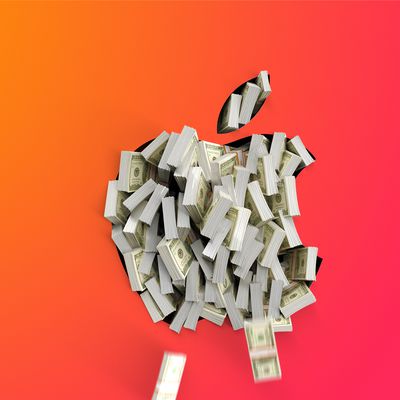Apple Working on 'Apple Pay Later' Feature With Monthly Installments for Apple Pay Purchases
Apple is developing a new pay later service that will let customers pay for Apple Pay purchases in installments over time, reports Bloomberg. Installment payment options will be available for all Apple Pay purchases, with the feature not limited to Apple products.

The service is similar to Paypal's Buy Now, Pay Later feature, and internally, it's being called "Apple Pay Later."
Apple is planning to partner with Goldman Sachs on the Apple Pay installments plan, with Goldman Sachs serving as the lender for the loans needed for the monthly installment plans. Apple currently works with Goldman Sachs on the Apple Card, but the new installment plan option is not limited to the Apple Card and will not require users to have an Apple Card to use the feature. According to Bloomberg, when a user makes a purchase using Apple Pay, they will be able to pay for it across four interest-free payments made every two weeks or across several months with interest.
The four payment play is called "Apple Pay in 4" internally, while the longer-term payment plans are dubbed "Apple Pay Monthly Installments." Users will be able to choose any credit card to make their payments over time with the Apple Pay Later plan, and it is not yet clear what interest rates will be.
As with the Apple Card, Apple Pay Later users will need to be approved through an application submitted through the Wallet app on the iPhone, which is also where payments will be managed. The service will not require a running credit check. Some of the Apple Pay Later plans will exclude late fees and processing fees, costing users only interest for the longer-term plans.
Apple is hoping the buy now, pay later system will increase Apple Pay adoption and persuade iPhone users to use their iPhone to pay for items instead of standard credit cards. According to Bloomberg, the service is still in development and features could be changed or canceled before it launches.
Popular Stories
U.S. President Donald Trump on Wednesday announced that steep tariffs will be applied to imports from many countries, starting April 9. The tariffs could have a significant impact on Apple, as the company assembles the majority of iPhones in China, and products imported to the U.S. from China will be subject to a 54% tariff.
iPhone prices could increase by up to 43% in the U.S. due to the...
If you have an older Apple device that you've been considering upgrading, you're probably wondering how the newly announced tariffs might impact prices going forward, and whether it's worth buying now before there's a price hike.
Given analyst and economist responses to the tariffs, market panic, and Trump's stance on the current financial chaos, the answer is that making a purchase...
iOS 19 will not be available on the iPhone XR, iPhone XS, or the iPhone XS Max, according a private account on social media site X that has accurately provided information on device compatibility in the past.
The iPhone XR, iPhone XS, and iPhone XS Max all have an A12 Bionic chip, so it looks like iOS 19 will discontinue support for that chip. All other iPhones that run iOS 18 are expected...
Apple has released iOS 18.4, bringing further refinements to Apple Intelligence features, a neat new capability to iPhone 15 Pro devices, new emoji, and more.
While not quite as packed with new features as Apple's preceding iOS 18 point releases, iOS 18.4 still introduces enhancements that aim to make your iPhone smarter and more intuitive. Below, we've listed 12 new things your iPhone ...
While the iPhone 17 Pro and iPhone 17 Pro Max are not expected to launch until September, there are already plenty of rumors about the devices.
Below, we recap key changes rumored for the iPhone 17 Pro models as of March 2025:
Aluminum frame: iPhone 17 Pro models are rumored to have an aluminum frame, whereas the iPhone 15 Pro and iPhone 16 Pro models have a titanium frame, and the iPhone ...
Apple stock dropped 4% in early Friday trading, broadly following yesterday's trend after China announced reciprocal tariffs in response to U.S. President Trump's trade policies.
The latest decline follows Thursday's dramatic 9% plunge that erased nearly $300 billion from Apple's market value – the company's worst single-day performance in five years – amid growing fears that Trump's...





















